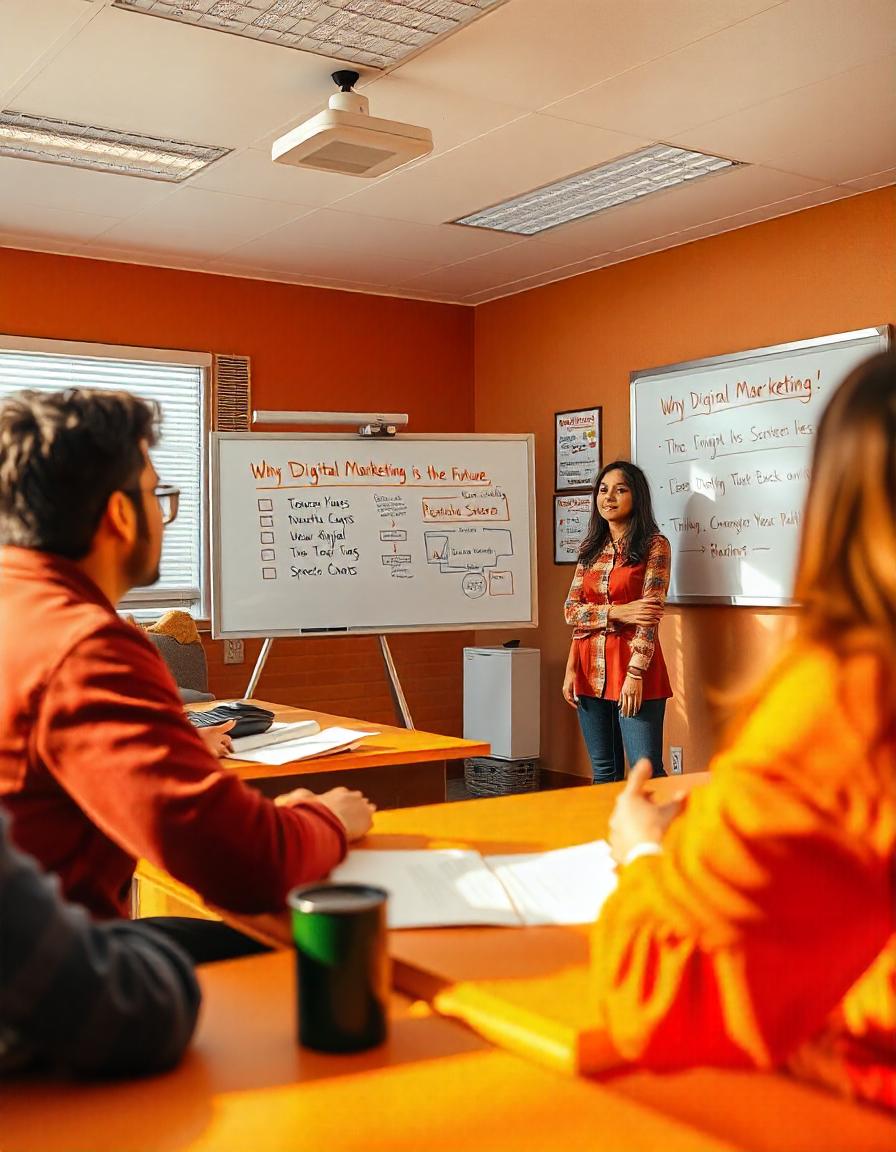As the internet continues to dominate communication and commerce, it’s clear that traditional marketing methods are no longer enough. The shift toward digital marketing is not just a trend—it’s a necessity for businesses looking to thrive in the modern marketplace. But why is digital marketing the future? What makes it so vital, and how can businesses use it to stay ahead of the curve?
This article will explore the key reasons why digital marketing is the future, how it’s changing the marketing landscape, and what solutions businesses can implement to leverage its power effectively.
What is Digital Marketing?
Before diving into why digital marketing is the future, it’s important to understand what digital marketing encompasses. Digital marketing refers to the use of digital channels, such as websites, social media platforms, search engines, email, and mobile apps, to promote products or services. Unlike traditional marketing methods, which rely on print, radio, and television, digital marketing allows businesses to connect with consumers in real time and on a personal level.
It includes a wide range of strategies and tactics, such as:
- Search Engine Optimization (SEO): Improving a website’s visibility on search engines to attract organic traffic.
- Pay-Per-Click (PPC) Advertising: Paying for ad placements on search engines or social media platforms to drive traffic.
- Content Marketing: Creating valuable content to engage audiences and build brand awareness.
- Email Marketing: Sending personalized messages directly to a user’s inbox.
- Social Media Marketing: Using platforms like Facebook, Instagram, and Twitter to engage with customers and promote products.
- Influencer Marketing: Partnering with influential individuals to reach a larger audience.
Now that we know what digital marketing is, let’s explore why it’s considered the future of marketing.
Why is Digital Marketing the Future?
1. Consumers are Spending More Time Online
One of the most compelling reasons digital marketing is the future is the undeniable shift in consumer behavior. People are spending more time online than ever before. Whether it’s browsing social media, shopping on e-commerce platforms, or consuming video content, the Internet has become the primary way consumers discover, interact with, and purchase from businesses.
According to recent data, over 4.9 billion people worldwide use the internet. This number continues to grow each year, providing businesses with an unprecedented opportunity to reach a global audience. Traditional marketing methods, like print ads or billboards, simply can’t match the reach and engagement that digital channels offer.
2. Cost-Effective Marketing for All Businesses
Digital marketing levels the playing field. In the past, only large corporations with big advertising budgets could afford to run significant marketing campaigns. However, with digital marketing, businesses of all sizes can promote their products and services in a cost-effective way.
For example, small businesses can use social media platforms to engage with customers without spending thousands of dollars on advertising. SEO allows businesses to improve their search rankings and attract organic traffic for a fraction of the cost of traditional marketing. This cost-effectiveness makes digital marketing the future, especially for startups and small businesses.
3. Data-Driven Insights and Measurable Results
One of the major advantages of digital marketing is the ability to track and measure every aspect of a campaign. In traditional marketing, it’s difficult to determine how many people saw a billboard or read a print ad. Digital marketing, on the other hand, provides real-time insights into campaign performance.
Businesses can monitor key metrics such as website traffic, click-through rates, conversion rates, and return on investment (ROI). This data-driven approach allows companies to make informed decisions, optimize their strategies, and achieve better results. The ability to measure success accurately is a significant reason why digital marketing is the future.
4. Targeted and Personalized Marketing
Consumers today expect personalized experiences. Generic advertising no longer works, and businesses need to tailor their messages to meet the specific needs and preferences of their target audience. Digital marketing allows for precise targeting, ensuring that the right message reaches the right person at the right time.
Through advanced targeting options, businesses can segment their audience based on factors like demographics, location, interests, and browsing behavior. This level of personalization helps increase engagement, build customer loyalty, and drive conversions.
5. Mobile Dominance and the Rise of E-Commerce
Mobile devices have become an integral part of our daily lives. In fact, more than half of all web traffic comes from mobile devices. With the rise of e-commerce, mobile apps, and mobile-friendly websites, businesses must adapt to this mobile-first environment.
Digital marketing enables businesses to reach consumers wherever they are, whether it’s through mobile search ads, push notifications, or SMS marketing. As mobile commerce continues to grow, digital marketing is the future because it aligns with how people prefer to browse and shop.
How Can Businesses Leverage Digital Marketing for Future Success?
Now that we’ve established why digital marketing is the future, the next question is how businesses can effectively implement it. Here are some actionable steps companies can take to stay ahead of the competition:
1. Develop a Comprehensive Digital Marketing Strategy
The key to successful digital marketing is having a well-defined strategy. Businesses should start by identifying their goals—whether that’s increasing brand awareness, driving website traffic, or boosting online sales. Once goals are set, companies can choose the digital marketing channels and tactics that align with those objectives.
For example, if the goal is to attract more customers, a business might invest in SEO to improve organic search rankings and implement PPC campaigns to generate quick traffic. A comprehensive digital marketing strategy ensures that all efforts work together cohesively to achieve measurable results.
2. Invest in Content Marketing
Content is the backbone of digital marketing. Whether it’s blog posts, videos, infographics, or podcasts, content marketing helps build brand authority, engage audiences, and drive conversions. Businesses should focus on creating valuable, informative, and relevant content that addresses the pain points and interests of their target audience.
By consistently producing high-quality content, businesses can establish themselves as thought leaders in their industry and attract loyal followers who trust their expertise.
3. Utilize Social Media Marketing
Social media has become a powerful marketing tool. Platforms like Facebook, Instagram, LinkedIn, and Twitter offer businesses the opportunity to connect directly with customers, build brand awareness, and promote products in a highly engaging way. By maintaining an active presence on social media and interacting with followers, businesses can foster meaningful relationships with their audience.
Social media also offers paid advertising options, which allow businesses to reach a larger audience based on specific targeting criteria.
4. Optimize for Mobile
With more consumers using mobile devices to browse and shop online, businesses must ensure their websites and marketing efforts are mobile-friendly. This includes having a responsive website design, fast load times, and mobile-optimized ads.
Additionally, businesses should explore mobile-specific marketing tactics such as SMS marketing, push notifications, and in-app advertising to reach customers on the go.
5. Focus on SEO
Search engine optimization (SEO) is critical for driving organic traffic to a website. By optimizing for relevant keywords, improving site structure, and producing high-quality content, businesses can improve their search engine rankings and attract more visitors. Since search engines are often the starting point for consumers looking for products or services, investing in SEO is essential for long-term success in digital marketing.
Solutions for Overcoming Digital Marketing Challenges
While digital marketing offers numerous benefits, it also comes with challenges. Here are a few solutions to common obstacles:
- Keeping up with trends: The digital landscape is constantly evolving. To stay ahead, businesses should continuously monitor industry trends, attend marketing webinars, and invest in ongoing education for their marketing teams.
- Managing multiple channels: With so many digital channels to manage, it can be overwhelming. Businesses can streamline their efforts by using marketing automation tools to schedule content, track performance, and manage campaigns efficiently.
- Maintaining authenticity: In the age of digital marketing, authenticity matters. Businesses should focus on building genuine relationships with their audience, being transparent, and staying true to their brand values.
The future of marketing is digital, driven by the growth of online platforms, changing consumer behaviors, and technological advancements. Digital marketing offers businesses an unparalleled opportunity to reach a global audience, create personalized experiences, and measure their success with precision.
To stay competitive, businesses must embrace digital marketing strategies, invest in the right tools, and continuously adapt to the evolving digital landscape. Those that do will be well-positioned to succeed in the future, as digital marketing becomes the dominant force in business growth.
Subscribe to Safegate World for daily updates.
Check Out Our Premium Services
To Advertise, Advertise Your Affiliate Links on Safegateworld.com
Related Articles
What Is Digital Marketing
Can Digital Marketing Make You Rich?
Digital Marketing and Affiliate Marketing
What Is Search Engine Optimization (SEO)?
What Is Content Marketing?
Pay-Per-Click (PPC) Advertising
Social Media Marketing
What is Email Marketing?
Building Brand Awareness













